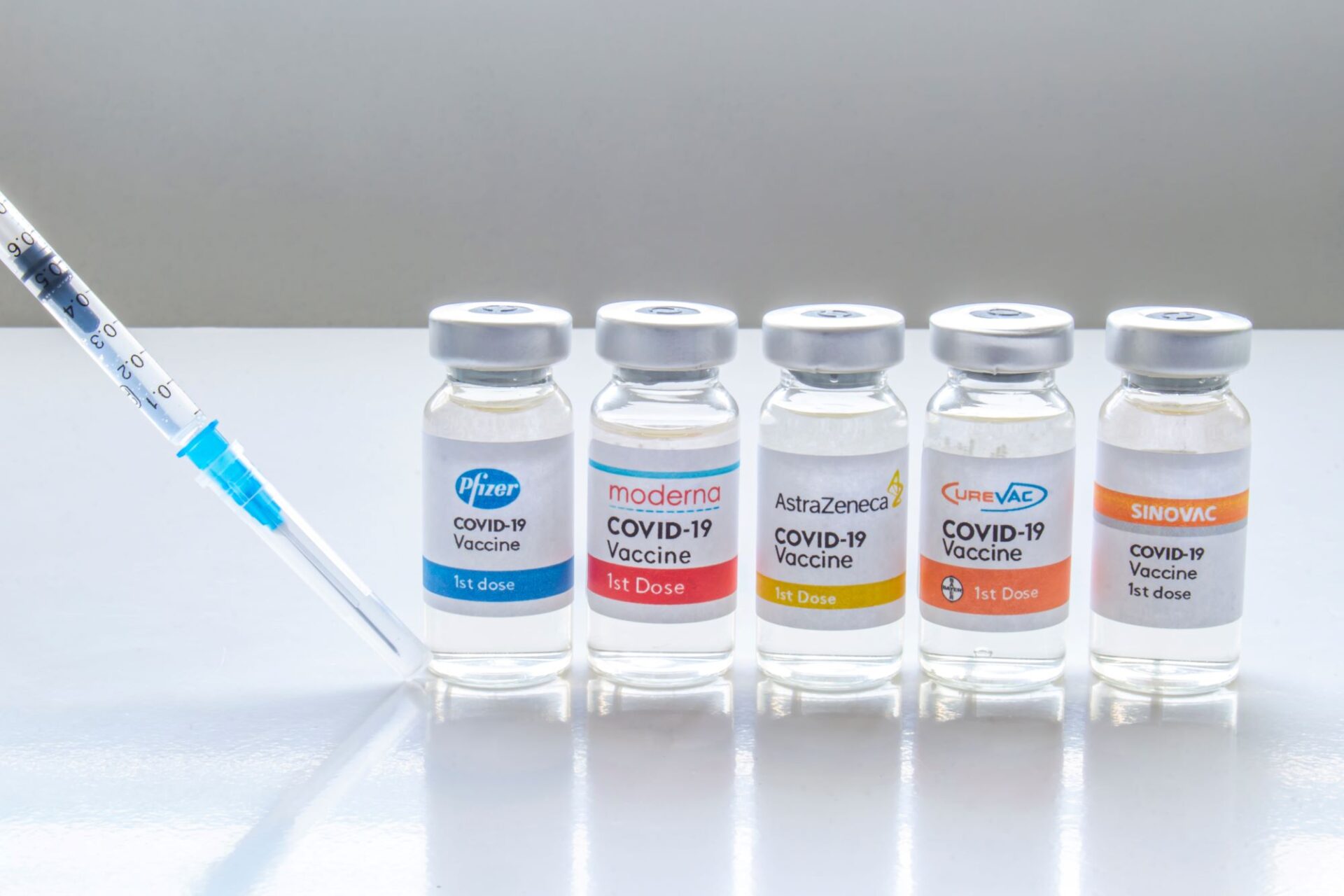Our globe is currently fastened by the deadly corona virus and almost half of the world’s population have been affected and tormented by this contagious disease. As we all know that Covid-19 is a respiratory disease caused by the SARS-COV-2 virus. Researchers on the earth are using their best skills to develop an effective medicine to prevent the spread of this contagion and to cure the infection. Currently, there are 114 candidate vaccines and 14 approved covid vaccines worldwide while 331 vaccines are under clinical trial across several countries. [1]
Covid-19 vaccine is a vaccine that aims to provide protection against corona virus by developing individual’s adaptive immune system. Now the question arises- how Covid-19 vaccination works? We know that the White Blood Cells (WBC), also known as immune cells, fights against any infection present in the body. White Blood Cells consists of ‘Macrophages’ which eats and break down the germs and dead (or dying) cells, ‘B- lymphocytes’ which produces antibodies to destroy the leftover particles of those viruses and ‘T- lymphocytes’ (memory cells) which attack already infected cells in the body. When Covid-19 vaccine is injected into a person, the body recognizes any unwanted protein present in it and starts producing B-lymphocytes and T- lymphocytes, therefore providing a ‘memory’ supply to the body that how they have to fight with the virus in the future.
Types of Covid-19 vaccines
Covid-19 vaccines aim to protect our body against corona virus by prompting our body to recognize it and destroy it rapidly. There are three types of vaccines-
- RNA or mRNA vaccine – Ribonucleic acid vaccine or messenger RNA vaccine contains materials of Covid-19 causing virus. It gives instructions to our blood cells to identify and destroy the corresponding pathogen cells.
- Sub unit vaccine – It supplies antigens or harmless pieces (proteins) of Covid -19 causing virus.
- Viral Vector vaccine – It consists of a modified version of a virus (not similar to Covid-19 virus), whose shell contains the particles from Covid-19 causing virus.
In all three types of vaccine, the final action and reaction of our body is the same. Our body recognizes that this protein should not be present in the body, and B-lymphocytes and T-lymphocytes recall their memory to fight against any Covid-19 causing virus in the future.
Names of Covid-19 vaccines available worldwide
Presently, the following vaccines are approved and authorized to people worldwide:
1. Pfizer-BioNTech (BNT 162b2)
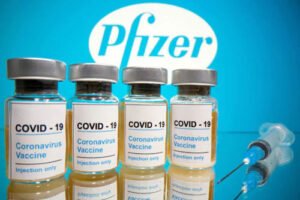 It is an mRNA based vaccine, developed by the German company BioNTech and partnered with the American company Pfizer. It is injected by intramuscular injection. Clinical trials for Pfizer started in April 2020 and had entered into its Phase III clinical trials within 7 months by November 2020.[2] The company confirmed its potential efficacy of 91.3% against Covid- 19 on the basis of interim analysis of study data and measured within 7 days up to 6 months of second dose.[3] Pfizer is the first Covid- 19 vaccine authorized by Stringent Regulatory Authority for emergency use and for regular use.
It is an mRNA based vaccine, developed by the German company BioNTech and partnered with the American company Pfizer. It is injected by intramuscular injection. Clinical trials for Pfizer started in April 2020 and had entered into its Phase III clinical trials within 7 months by November 2020.[2] The company confirmed its potential efficacy of 91.3% against Covid- 19 on the basis of interim analysis of study data and measured within 7 days up to 6 months of second dose.[3] Pfizer is the first Covid- 19 vaccine authorized by Stringent Regulatory Authority for emergency use and for regular use.
Pfizer vaccine is available in 84 countries worldwide – Albania, Argentina, Australia, Austria, Bahrain, Belgium, Bosnia and Herzegovina, Botswana, Brazil, Brunei Darussalam, Bulgaria, Canada, Chile, Colombia, Costa Rica, Croatia, Cyprus, Czechia, Denmark, Dominican Republic, Ecuador, El Salvador, Estonia, Faroe Islands, Finland, France, Germany, Greece, Greenland, Hong Kong, Hungary, Iceland, Iraq, Ireland, Israel, Italy, Japan, Jordan, Kuwait, Latvia, Lebanon, Liechtenstein, Lithuania, Luxembourg, Malaysia, Maldives, Malta, Mexico, Monaco, Mongolia, Netherlands, New Zealand, North Macedonia, Norway, Oman, Panama, Peru, Philippines, Poland, Portugal, Qatar, Republic of Korea, Republic of Moldova, Romania, Rwanda, Saudi Arabia, Serbia, Singapore, Slovakia, Slovenia, South Africa, Spain, Sweden, Switzerland, Tunisia, Turkey, Ukraine, Ukraine, United Arab Emirates, United Kingdom of Great Britain and Northern Ireland, United States of America, Uruguay, Vatican and West Bank.
How many shots of Pfizer Covid-19 Vaccine are required?
You need minimum two shots to get the most protection. Second shot is given after 21 days of the first shot, and makes you fully vaccinated. It is advisable to get a booster dose (third dose) of the vaccine within 12 months of getting fully vaccinated.[4] It is injected in the muscle of the upper arm.
How effective is Pfizer Covid-19 vaccine?
It has been proved through various researches and analysis that the efficacy of Pfizer- BioNTech vaccination against Covid- 19 is 28% after the first dose and more than 94% in 65+ years old people. It has also been observed that Pfizer efficacy is consistent across all ages, genders, racial and ethnicity demographics.[5] The duration of protection against the infection is currently unknown.
Who can get Pfizer-BioNTech vaccine shot?
To get the maximum benefit of Pfizer, a person should fulfill the following eligibility requirements:
- Age 16 years or older.
- Person should not have a severe allergic reaction or an immediate allergic reaction to any ingredient of the vaccine.
- Person suffering from hypertension (High B.P.), asthma, diabetes, pulmonary, liver or kidney disease and any chronic infections can also get Pfizer- BioNTech vaccinated, provided that such health problems are stable and under control.
What are the side effects of Pfizer vaccine?
There is a very little possibility of getting severe allergic reactions after getting a dose of Pfizer – BioNTech vaccine. A person may feel allergic symptoms like difficult breathing, swelling on face and throat, bad rashes over the body, fast heartbeat and dizziness within a few minutes to one hour after getting the dose. Other few possible short- term side- effects of Covid vaccination are:
- Pain, swelling or redness at injection site
- Fatigue
- Headache
- Muscle pain
- Fever
- Non-severe allergic reactions like rash, hives, itching or swelling on the face.
- Chills
- Joint pain
- Nausea
- Swollen lymph nodes
- Diarrhea
- Vomiting
Please note that this is not the comprehensive list of all possible side- effects of Pfizer – BioNTech vaccination. Possible serious and long-term side effects of Pfizer- BioNTech vaccine are still unknown and under study in clinical trials.
2. Moderna (mRNA- 1273)

It is a mRNA type vaccine developed by an American pharmaceutical and biotechnology company ‘Moderna’. Likewise Pfizer – BioNTech, Moderna is also a main mRNA vaccine approved in 2020 to fight against corona virus. The vaccine was first authorized for public use in Canada in December 2020 and later by Israel, European Union, United Kingdom and Singapore in next 30-40 days.
Moderna is approved in 45 countries – Austria, Belgium, Bulgaria, Canada, Croatia, Cyprus, Czechia, Denmark, Estonia, Faroe Islands, Finland, France, Germany, Greece, Greenland, Guatemala, Honduras, Hungary, Iceland, Ireland, Israel, Italy, Latvia, Liechtenstein, Lithuania, Luxembourg, Malta, Mongolia, Netherlands, Norway, Poland, Portugal, Qatar, Romania, Rwanda, Seychelles, Singapore, Slovakia, Slovenia, Spain, Sweden, Switzerland, United Kingdom of Great Britain and Northern Ireland, United States of America and West Bank.
How many doses of Moderna Vaccine are required?
Two shots of 0.5 ml are given at an interval of 28 days through an intramuscular injection into the deltoid muscle of the upper arm.
What is the effectiveness of Moderna covid vaccine?
The efficacy of Moderna Covid-19 vaccination initiates after 15 days of first dose. Complete efficacy is achieved only after 15 days of the second dose. Moderna efficacy to prevent corona virus is 94.1%[6] and is consistent across age, gender, races and ethical demographics.
Who can get Moderna Covid-19 vaccine?
- A person who is 18 years old or above.
- A person who is not having a severe allergic reaction or an immediate allergic reaction to any ingredient of the vaccine.
- Person suffering from hypertension (High B.P.), asthma, diabetes, pulmonary, liver or kidney disease and any chronic infections can also get Moderna vaccinated, provided that such health problems are stable and under control.
Side effects of Moderna Covid- 19 vaccine
Here is a list of common and rare side-effects of Moderna.
- Pain in muscles and joints
- Low energy
- Headache
- Fever
- Swollen lymph nodes
- Nausea
- Pain, swelling or redness at injection site
- Chills
All these symptoms are temporary, non-threatening and tend to disappear after a couple of days. A person may feel more intense effects after the second shot than the ones they suffered after the first shot. Generally, old people experience lesser side- effects than younger ones. Females are also likely to experience more side effects after vaccination than males.[7] The reason behind such different experiences between different ages and genders is yet unknown.
3. Sputnik V Vaccination
 It is a viral vector vaccine developed in Russia by ‘Gamaleya Research Institute of Epidemiology and Microbiology’ and registered by the Russian Ministry of Health as ‘Gam- COVID- Vac’ on 11 August 2020. Sputnik V Phase III clinical trial is scheduled to run till May 2021. An interim analysis from Moscow trial proved an efficacy of 91.6% after the second shot of the vaccine with an absence of any unusual side- effects.[8] Health Ministry of India has also declared on 13 April 2021 that this vaccine is safe and has immunogenicity, and hence got its first consignment of 1.5 lakh doses of Sputnik V later in the month of April. Being a relatively low-cost Covid vaccine, Sputnik V had gained popularity among several countries amidst the spread of second and third waves of the corona virus.
It is a viral vector vaccine developed in Russia by ‘Gamaleya Research Institute of Epidemiology and Microbiology’ and registered by the Russian Ministry of Health as ‘Gam- COVID- Vac’ on 11 August 2020. Sputnik V Phase III clinical trial is scheduled to run till May 2021. An interim analysis from Moscow trial proved an efficacy of 91.6% after the second shot of the vaccine with an absence of any unusual side- effects.[8] Health Ministry of India has also declared on 13 April 2021 that this vaccine is safe and has immunogenicity, and hence got its first consignment of 1.5 lakh doses of Sputnik V later in the month of April. Being a relatively low-cost Covid vaccine, Sputnik V had gained popularity among several countries amidst the spread of second and third waves of the corona virus.
Sputnik V vaccine is approved for use in 65 countries – Albania, Algeria, Angola, Antigua and Barbuda, Argentina, Armenia, Azerbaijan, Bahrain, Bangladesh, Belarus, Bolivia (Plurinational State of), Bosnia and Herzegovina, Cameroon, Djibouti, Egypt, Gabon, Ghana, Guatemala, Guinea, Guyana, Honduras, Hungary, India, Iran (Islamic Republic of), Iraq, Jordan, Kazakhstan, Kenya, Kyrgyzstan, Lao People’s Democratic Republic, Lebanon, Libya, Mali, Mauritius, Mexico, Mongolia, Montenegro, Morocco, Myanmar, Namibia, Nepal, Nicaragua, North Macedonia, Pakistan, Panama, Paraguay, Philippines, Republic of Moldova, Republic of the Congo, Russian Federation, Saint Vincent and the Grenadines, San Marino, Serbia, Seychelles, Slovakia, Sri Lanka, Syrian Arab Republic, Tunisia, Turkmenistan, United Arab Emirates, Uzbekistan, Venezuela (Bolivarian Republic of), Viet Nam, West Bank and Zimbabwe.
How many shots of Sputnik V Vaccine are required?
Two doses of 0.5 ml each at an interval of 21 days are administered intramuscularly for full protection. Russia is planning to conduct a clinical trial of “Sputnik Light” version which will be a single dose vaccination with an expected efficacy of 85%.[9] The one-dose vaccination would probably be used outside Russia only with an aim to speed up vaccination supply to help the countries with high infection rate.
How effective is Sputnik V vaccine?
On the basis of analysis of data collected from 3.8 million Russians, it has been reported by the Gamaleya Research Institute of Epidemiology and Microbiology, and the Russian Direct Investment Fund that the efficacy rate of Sputnik V Covid- 19 vaccine is 97.6% (after both doses). The Director of the Institute further states that the actual efficacy of the vaccine may be even higher due to a time lag between the date of collection of the sample and the date of the diagnosis of the disease.[10]
Who can get Sputnik V vaccine?
A person who is 18 years old and above is eligible for this vaccine. No other special requirements are yet known. It is advisable to have a word of mouth with your medical practitioner in case you are suffering from any ailment.
Side effects of Sputnik V vaccine
There are rarely any proven adverse effects of this vaccine apart from mild headache and redness at injection site. Any serious side- effects are not yet proved to be linked to it.[11] Sputnik V is believed to be one of the best covid vaccines globally.
4. Janssen COVID-19 vaccine (JNJ-78436735)
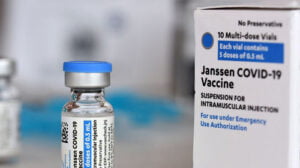 It is also a viral vector vaccine developed by Janssen Vaccines in Leiden, Netherlands and its Belgian parent company Janssen Pharmaceuticals (a subsidiary of American company Johnson & Johnson). The company is providing this vaccine on not-for-profit basis for use during emergency pandemic. Janssen vaccine is the first Covid-19 vaccine which can be administered as a single dose. The vaccination got approval from WHO on 12 March 2021 for emergency use.
It is also a viral vector vaccine developed by Janssen Vaccines in Leiden, Netherlands and its Belgian parent company Janssen Pharmaceuticals (a subsidiary of American company Johnson & Johnson). The company is providing this vaccine on not-for-profit basis for use during emergency pandemic. Janssen vaccine is the first Covid-19 vaccine which can be administered as a single dose. The vaccination got approval from WHO on 12 March 2021 for emergency use.
How many shots of Janssen vaccine are required?
This vaccine requires a single dose only through an intramuscular injection in the muscle of upper arm.
What is the efficacy of Janssen vaccine?
Janssen has announced on 29 January 2021 that their vaccine is highly effective- with 66% effectiveness to prevent symptomatic disease, 85% effectiveness against severe Covid-19 illness and 100% effectiveness against any hospitalization or death due to corona.[12] Please note that according to FDA, the efficacy threshold for Covid- 19 vaccines is minimum 50%.[13]
Who can get Janssen vaccination?
- A person who is 18 years old or above.
- A person who hadn’t any severe allergic reaction to any ingredient of this vaccine.
Side effects of Janssen Covid-19 vaccine
Following side effects are yet reported after getting this vaccine.
- Pain, redness and swelling at injection site.
- General side- effects like headache, low energy, muscle pain, fever and nausea.
- Severe allergic reactions including difficulty in breathing, fast heartbeat, swelling on face and throat, bad rashes all over the body, dizziness and extreme weakness.
There can be some other possible general, serious and unexpected side- effects of this vaccine as it is still under study in clinical traits. Recently it was found that six women in U.S. between the age of 18 and 48 years, had developed a rare blood-clotting disorder along with other symptoms which highlighted 6 to 13 days after getting the shot, due to which one woman died and another was left in critical condition. Soon after this report, FDA issued a statement wherein it recommended a pause in the use of its vaccine as an excessively cautious approach. According to Dr. Peter Marks, director of FDA’s Center for Biologics Evaluation and Research, this is an extremely rare immunity response which some people encounter after getting the vaccine. Because of such immune response, their platelets gets activated resulting into extremely rare blood clots.[14]
5. Covaxin (BBV152)
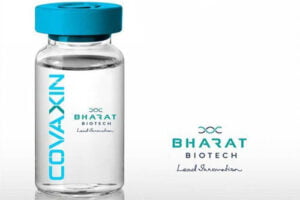 Covaxin is the most popular Covid-19 vaccine in India. It is an inactivated virus-based vaccine developed by Bharat Biotech in collaboration with the Indian Council of Medical Research (ICMR)- National Institute of Virology (NIV). Being an inactivated virus, it contains dead virus which doesn’t replicate and is incapable of infecting people but has a good ability to instruct our immune system to safeguard the body against any infection. This vaccine technology has been used successfully in curing many other diseases like Polio, Seasonal Influenza, Pertussis, Rabies, and Japanese Encephalitis. Immune- potentiators, also known as adjuvants, are also added in this vaccine to increase and boost its immunogenicity. Covaxin got approval for Phase I and Phase II Human Clinical Trials in July 2020 wherein it showed excellent safety data, enhanced immune response and only 15% of all side- effects combined.[15] Covaxin clinical trials will start soon in other countries as well.
Covaxin is the most popular Covid-19 vaccine in India. It is an inactivated virus-based vaccine developed by Bharat Biotech in collaboration with the Indian Council of Medical Research (ICMR)- National Institute of Virology (NIV). Being an inactivated virus, it contains dead virus which doesn’t replicate and is incapable of infecting people but has a good ability to instruct our immune system to safeguard the body against any infection. This vaccine technology has been used successfully in curing many other diseases like Polio, Seasonal Influenza, Pertussis, Rabies, and Japanese Encephalitis. Immune- potentiators, also known as adjuvants, are also added in this vaccine to increase and boost its immunogenicity. Covaxin got approval for Phase I and Phase II Human Clinical Trials in July 2020 wherein it showed excellent safety data, enhanced immune response and only 15% of all side- effects combined.[15] Covaxin clinical trials will start soon in other countries as well.
Presently, countries like Mongolia, Myanmar, Sri Lanka, Philippines, Bahrain, Oman, Maldives and Mauritius are taking supplies from government to government.
Countries where Covaxin has been approved are – Guyana, India, Iran (Islamic Republic of), Mauritius, Mexico, Nepal, Paraguay, Philippines and Zimbabwe.
How many shots of Covaxin are required?
Covaxin is a two-dose vaccination injected intramuscularly at an interval of 28 days.
What is the efficacy of Covaxin vaccine?
Covaxin has shown 100% efficacy at preventing from hospitalization due to severe illness, 78% efficacy[16] against mild, moderate and severe disease, and 81% interim efficacy in preventing disease in those without prior infection after the second dose.[15]
Who can get Covaxin vaccination?
- Any person who is 18 years old or above.
- A person who was not having a severe allergic reaction in the past to any ingredient of the vaccine or after getting the first dose of the vaccine.
- A person who is not having an acute infection or fever.
- A pregnant or lactating woman should avoid this vaccine as its effects are not yet studied on pregnant and nursing ladies.
What are side effects of Covaxin?
Covaxin is the safest vaccine. Depending on person to person, the following side effects can be seen :
- Pain, swelling, itching or redness at injection site
- Headache
- Fever
- Nausea
- Vomiting
- Rashes
- Body ache
- Severe allergic reaction (in a very rare case)
6. Oxford–AstraZeneca (Covishield) COVID-19 vaccine (AZD1222)
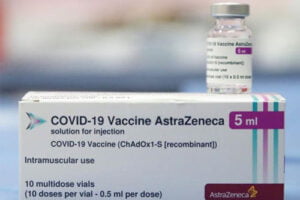 Also known as Vaxzevria and Covishield, it is another approved corona vaccine in India. This is a viral vector vaccine developed by Oxford University and AstraZeneca, and marketed under the brand name Covishield by the Serum Institute of India (SII). The vaccine got its first approval on 30 December 2020 at the Covid- 19 vaccine program in the United Kingdom. The study, ‘A Real-World Evaluation of the safety and immunogenicity of the Covishield vaccine, ChAdOx1 nCoV- 19 Corona Virus Vaccine (Recombinant) in Health Care Workers (HCW) in National Capital Region (NCR) of India: A preliminary report’, which took place in a hospital in NCR Delhi and wherein 6962 healthcare workers had registered for this vaccination showed that the vaccine has an acceptable safety profile, has limited mild side-effects which may last for 2-4 days and has a fair early response (within 2 weeks).[17] Being an Indian institute, SII is giving priority to the huge needs of the country while balancing the demands of other countries of the world.
Also known as Vaxzevria and Covishield, it is another approved corona vaccine in India. This is a viral vector vaccine developed by Oxford University and AstraZeneca, and marketed under the brand name Covishield by the Serum Institute of India (SII). The vaccine got its first approval on 30 December 2020 at the Covid- 19 vaccine program in the United Kingdom. The study, ‘A Real-World Evaluation of the safety and immunogenicity of the Covishield vaccine, ChAdOx1 nCoV- 19 Corona Virus Vaccine (Recombinant) in Health Care Workers (HCW) in National Capital Region (NCR) of India: A preliminary report’, which took place in a hospital in NCR Delhi and wherein 6962 healthcare workers had registered for this vaccination showed that the vaccine has an acceptable safety profile, has limited mild side-effects which may last for 2-4 days and has a fair early response (within 2 weeks).[17] Being an Indian institute, SII is giving priority to the huge needs of the country while balancing the demands of other countries of the world.
Covishield is approved in 40 countries – Afghanistan, Antigua and Barbuda, Argentina, Bahrain, Bangladesh, Barbados, Bhutan, Bolivia (Plurinational State of), Botswana, Brazil, Cabo Verde, Canada, Côte d’Ivoire, Dominica, Egypt, Ethiopia, Ghana, Grenada, Hungary, India, Jamaica, Lebanon, Maldives, Morocco, Namibia, Nepal, Nigeria, Saint Kitts and Nevis, Saint Lucia, Saint Vincent and the Grenadines, Seychelles, Solomon Islands, Somalia, South Africa, Sri Lanka, Suriname, The Bahamas, Tonga, Trinidad and Tobago and Ukraine.
What is the required dose of Covishield?
The vaccine is administered by two shots of 0.5 ml each, injected intramuscularly into the deltoid muscle. The product label on the vaccine indicates that the time interval between both shots should be of 4 weeks to 12 weeks. However, considering the fact that double-dose efficacy and immunogenicity escalates with a longer interdose interval, WHO recommends that the time interval between both shots of Covishield vaccine should be of 8 weeks to 12 weeks.[18]
What is the efficacy of Covishield?
According to an analysis published in ‘The Lancet’ on 19 February 2021, efficacy of ChAdOx1 nCoV-19 is 76% from day 22 after the first dose which rises to 81.3% after the second dose (provided that the second dose is given at an interval of 12 weeks).[19]
Who can get Covishield?
A person who fulfils following requirements is eligible for this vaccination.
- Age 18 years or above.
- Person who is not allergic to any ingredient of the vaccine or has not shown a severe allergic reaction after a previous dose of the vaccine.
Side effects of SII Covishield or Vaxzevria vaccine
Like other Covid vaccines, Covishield also has more or less similar after-effects, like fever, chills, nausea, muscle pain, joint pain, tiredness, headache and pain/ swelling/ redness at injection site. Rare symptoms of dizziness, decreased appetite, enlarged lymph nodes, excessive sweating, itchy skin, rash, vomiting and flu-like symptoms can also happen. Unusual blood clots with low platelets count is an extremely uncommon side-effect of this vaccination.[20]
7. Sinopharm COVID-19 vaccine (BBIBP-CorV)
 It is another inactivated virus vaccine for Covid-19 and shares similar technology with Covaxin and CoronaVac. The vaccine was developed by Sinopharm, a Chinese state-owned enterprise. The company started developing the vaccine against the disease in January 2020 and reported in June that the vaccine doesn’t cause any harmful side-effects on the basis of Phase ½ trial results. Interim results declared by UAE in December 2020 on the basis of Phase III trial showed the efficacy of 86% against the infection due to corona virus. Few days later, Sinopharm declared its internal analysis results wherein the vaccine indicated 79% efficacy.[21]
It is another inactivated virus vaccine for Covid-19 and shares similar technology with Covaxin and CoronaVac. The vaccine was developed by Sinopharm, a Chinese state-owned enterprise. The company started developing the vaccine against the disease in January 2020 and reported in June that the vaccine doesn’t cause any harmful side-effects on the basis of Phase ½ trial results. Interim results declared by UAE in December 2020 on the basis of Phase III trial showed the efficacy of 86% against the infection due to corona virus. Few days later, Sinopharm declared its internal analysis results wherein the vaccine indicated 79% efficacy.[21]
Sinopharm BBIBP-CorV vaccine is approved in 40 countries – Argentina, Bahrain, Belarus, Bolivia (Plurinational State of), Brunei Darussalam, Cambodia, Cameroon, China, Comoros, Egypt, Equatorial Guinea, Gabon, Guyana, Hungary, Iran (Islamic Republic of), Iraq, Jordan, Kyrgyzstan, Lao People’s Democratic Republic, Lebanon, Maldives, Mongolia, Montenegro, Morocco, Mozambique, Namibia, Nepal, Niger, North Macedonia, Pakistan, Peru, Republic of the Congo, Senegal, Serbia, Seychelles, Sierra Leone, Somalia, United Arab Emirates, Venezuela (Bolivarian Republic of) and Zimbabwe.
How many doses Sinopharm BBIBP-CorV are required?
The vaccine is injected intramuscularly in two shots at an interval of 21 days. People with low immune response (as indicated through antibody test) may be asked for third dose of this vaccination to boost their immunity.[22]
How effective is Sinopharm BBIBP-CorV Vaccine?
UAE had announced 86% efficacy of BBIBP-CorV against Covid-19 and Sinopharm had declared 79% efficacy of the vaccine on the basis of its internal analysis. However, WHO experts have expressed ‘very low confidence’ in the data (related to the risks associated with their side-effect) as provided by a Chinese state- owned company. But they have asserted their complete confidence in the ability of the vaccination to prevent infection.[23]
Who can get Sinopharm BBIBP-CorV Covid-19 vaccine?
- A person who is 18 years old or above.
- Nursing mothers, pregnant ladies and people with severe allergic reactions to any ingredient of the vaccine should avoid it.
Side effects of Sinopharm BBIBP-CorV vaccination
Like all other Covid- 19 vaccines side- effects, BBIBP-CorV can also cause common after-effects including fever, fatigue, headache, body ache, chills and nausea.
Frequently Asked Questions About Vaccine
1. Why do we get fever after vaccination?
Getting fever is a normal post-vaccination symptom and a part of the process of building immune system.
2. Which is best Covid-19 vaccine?
The best vaccination for Covid-19 is the one that is easily available to you. All vaccinations are well- researched, authorized by at least one national regulatory authority, equally safe and effective.
3. Can a pregnant woman or lactating woman get Covid-19 vaccine?
Most of the vaccines are not studied on pregnant ladies. But it has been observed that the benefits of vaccination are more than potential side effects. A breastfeeding woman can get mRNA vaccine as it doesn’t enter into the nucleus of the cell and degrades rapidly.[24] It is strongly advised that pregnant woman and lactating woman should consult with their health care provider if they are planning to get a vaccine.
4. What should you mention to your vaccination provider before you get Covid vaccine?
Don’t forget to inform your vaccination provider if you :
- have any allergies
- have a fever
- have a bleeding disorder or are on a blood thinner
- are immune-compromised or are on any medicine that affects your immune system
- are pregnant or trying to conceive
- are breastfeeding
- have got another COVID-19 vaccine
5. Can I take vaccination during my menstruation period or menopause?
Another frequently asked question is – Does Covid vaccines affect periods? Many females have noticed that there was a change in their menstrual cycle after getting one or both shots of mRNA vaccine. A lady reported that she got period 10 days in advance after getting a single dose of Moderna. Another woman who was undergoing her menopause reported that she got her first period in 28 months.[25] Several other women reported heavy flow, early periods, bleeding in the middle of birth control pack and other changes in the menstrual cycle. This change in bleeding pattern could be because of different ways in which our immune system activates and responds to the vaccination.
6. What is the meaning of vaccine efficacy?
Some people misunderstand the term ‘vaccine efficacy’. When we say 92% efficacy, it doesn’t mean that 92 out of 100 people get protection from the virus. It denotes that there is 92% reduction in the disease due to infection among the vaccinated group of people, or 92% reduction from the number of cases that were otherwise expected to happen if they were not vaccinated.[26]
7. For how long you stay protected after getting Covid vaccine?
Though trials and studies are still going on upon this topic, experts believe the effectiveness may last for minimum six months (or even more) after getting a complete dose of the vaccination.[27]
8. What to do if I am tested positive for Covid-19 after getting the first dose of the vaccination?
As a person doesn’t get complete benefit of the vaccine unless he receives its minimum required shots, it is possible that he turns Covid-19 positive after getting the first shot and before getting the second shot of the vaccine. In such a case, it is advised NOT to get the second dose when you are sick. You can get your second shot after your isolation period gets over and your Covid-19 reports shows negative. The second dose of mRNA vaccines can be administered up to 6 weeks (42 days) after the first dose.[28]
Disclaimer: This information is curated from several reference sources as listed below and accurate to the best of our knowledge. This article is meant for information only and needs continuous updates of information. We do not provide any recommendation for a specific covid vaccine. (last updated on 08th May of 2021)
References:
- https://covid19.trackvaccines.org/vaccines/
- https://investors.biontech.de/static-files/53f0968a-279b-4f82-a2fc-d67dcb6e4e91
- https://investors.biontech.de/news-releases/news-release-details/pfizer-and-biontech-confirm-high-efficacy-and-no-serious-safety
- https://www.cnbc.com/2021/04/15/pfizer-ceo-says-third-covid-vaccine-dose-likely-needed-within-12-months.html
- https://www.pfizer.com/news/press-release/press-release-detail/pfizer-and-biontech-conclude-phase-3-study-covid-19-vaccine
- https://www.contagionlive.com/view/moderna-vaccine-significant-covid-19-prevention-efficacy-phase-3-data
- https://www.healthline.com/health-news/moderna-covid-19-vaccine-side-effects-how-long-they-last#The-most-common-side-effects-after-the-Moderna-shot
- https://www.ncbi.nlm.nih.gov/pmc/articles/PMC7852454/
- https://www.reuters.com/article/us-health-coronavirus-russia-vaccine-idUSKBN29G17Y
- https://www.pharmaceutical-technology.com/news/russia-sputnik-v-efficacy/
- https://www.republicworld.com/technology-news/science/sputnik-v-covid-19-vaccine-know-the-price-efficacy-and-side-effects.html
- https://abcnews.go.com/Health/johnson-johnson-single-shot-vaccine-85-effective-severe/story?id=75557358
- https://www.nbcnews.com/health/health-news/fda-s-cutoff-covid-19-vaccine-effectiveness-50-percent-what-n1245506
- https://www.cnbc.com/2021/04/13/us-regulators-reportedly-call-for-pause-in-use-of-johnson-johnson-vaccine-due-to-clotting-issues.html
- https://www.bharatbiotech.com/covaxin.html
- https://www.clinicaltrialsarena.com/analysis/covaxin-indias-homegrown-covid-19-vaccine-brings-hope-and-controversy/
- https://www.news-medical.net/news/20210426/Real-world-study-in-India-finds-COVISHIELD-vaccine-safe-and-effective.aspx
- https://apps.who.int/iris/bitstream/handle/10665/340920/WHO-2019-nCoV-vaccines-SAGE_recommendation-AZD1222-2021.2-eng.pdf
- https://www.thelancet.com/journals/lancet/article/PIIS0140-6736(21)00432-3/fulltext
- https://www.medicalnewstoday.com/articles/oxford-astrazeneca-vaccine-what-to-know-about-side-effects#Controversy-regarding-blood-clots
- https://www.nytimes.com/interactive/2020/health/sinopharm-covid-19-vaccine.html
- https://www.washingtonpost.com/world/middle_east/uae-sinopharm-third-dose/2021/03/21/588fcf0a-8a26-11eb-a33e-da28941cb9ac_story.html
- https://www.thenews.com.pk/print/831219-who-confident-about-sinopharm-vaccine-efficacy-but-not-its-data
- https://www.who.int/news-room/feature-stories/detail/who-can-take-the-pfizer-biontech-covid-19–vaccine
- https://www.nbcchicago.com/news/coronavirus/does-the-covid-vaccine-affect-your-period-survey-launched-after-some-report-changes-to-menstruation/2494064/?amp
- https://www.cdc.gov/csels/dsepd/ss1978/lesson3/section6.html
- https://apnews.com/article/how-long-covid-19-vaccine-protection-last-49340b077e271a750ad804128dbb5f53
- https://www.cdc.gov/vaccines/covid-19/info-by-product/clinical-considerations.html

